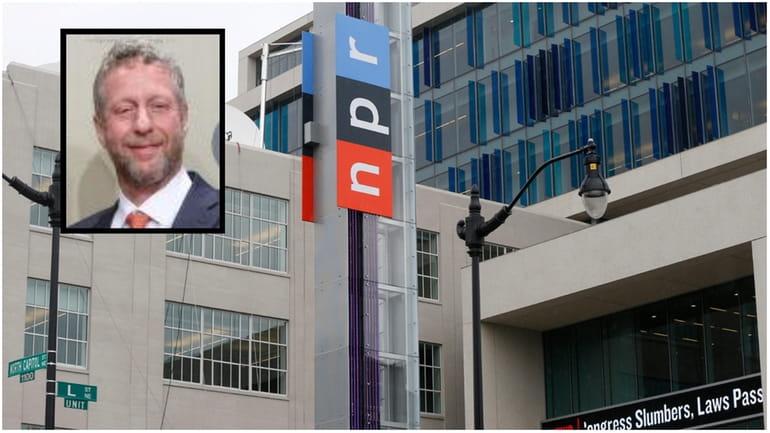NPR editor's critique, departure shows it needs balance

NPR’s headquarters in Washington, and inset, Uri Berliner, a senior editor who resigned over what he calls a stifling climate of political intolerance. Credit: AP / Charles Dharapak, WireImage / JP Yim
Has National Public Radio become too left-wing and mired in progressive dogma, alienating many American listeners?
That’s the charge made in a recent piece by now-former NPR senior editor Uri Berliner, who penned a critique of the network for The Free Press, a center-right publication. After the article made a big splash, Berliner was briefly suspended and then resigned from his job over what he says is a stifling climate of political intolerance.
Berliner's critics have pushed back, saying that the complaints are ill-informed. Meanwhile, the right-of-center backlash against NPR — which Donald Trump is proposing to defund — has been further fueled by revelations that the network's newly appointed CEO, Katherine Maher, has a history of tweets that express views fairly described as far left. At the start of the racial justice protests in 2020, she wrote that “looting is counterproductive,” but “it’s hard to be mad about protests not prioritizing the private property of a system of oppression founded on treating people’s ancestors as private property.”
While the CEO of NPR has no role in determining editorial content, to have someone with such opinions at the helm does contribute to the perception that the station is out of touch. Her 2022 comment in a speech she gave as CEO of Wikipedia stating that “reverence for the truth might be a distraction that is getting in the way of finding common ground and getting things done” raises more concerns.
Berliner’s criticism of NPR can certainly be questioned. His charge that the station heedlessly promoted “Russiagate” — the accusations of collusion between Trump’s 2016 campaign and Russian agents to undermine Hillary Clinton — is somewhat undercut by his apparent assumption that the charges were found to be completely baseless. Special counsel Robert Mueller found that Russian agents did illegally interfere to help Trump and that, while Trump’s campaign did not conspire with them in advance, it welcomed and knowingly took advantage of these actions. And he seems to overstate his case that NPR “hitched [its] wagon” to Rep. Adam Schiff, the California Democrat who became a manager of Trump's first impeachment, in discussions of the topic.
But Berliner is on much more solid ground when he argues that NPR has become mired in race- and gender-based progressive identity politics, with employees required to attend identity-focused “affinity groups” and with little or no ideological diversity on such topics. Some of the critiques of his piece, such as one by Alicia Montgomery at Slate, actually support this claim. Montgomery acknowledges that NPR was reluctant to cover violence by the MS-13 gang because it might play into Trump’s anti-immigrant rhetoric and shied away from discussing white victims of police brutality.
What’s the solution? Obviously, despite being tax-funded, NPR should not give equal time to all opinions held by taxpayers, such as the debunked conspiracy theories about the “stolen” 2020 election. But it needs a wider range of sane liberal, centrist, conservative and libertarian views and more attention to balance in covering stories that do have legitimate different sides.
Berliner makes a good case, for instance, that there was no such balance on NPR with regard to the “lab leak” theory of the origins of COVID-19, which he says was not given sufficient consideration.
Public radio can play a uniquely valuable role in providing thoughtful discussion and analysis — particularly in an age of extreme and divisive rhetoric. But first, it must fix the problem of gaining back public trust.
Opinions expressed by Cathy Young, a writer for The Bulwark, are her own.

